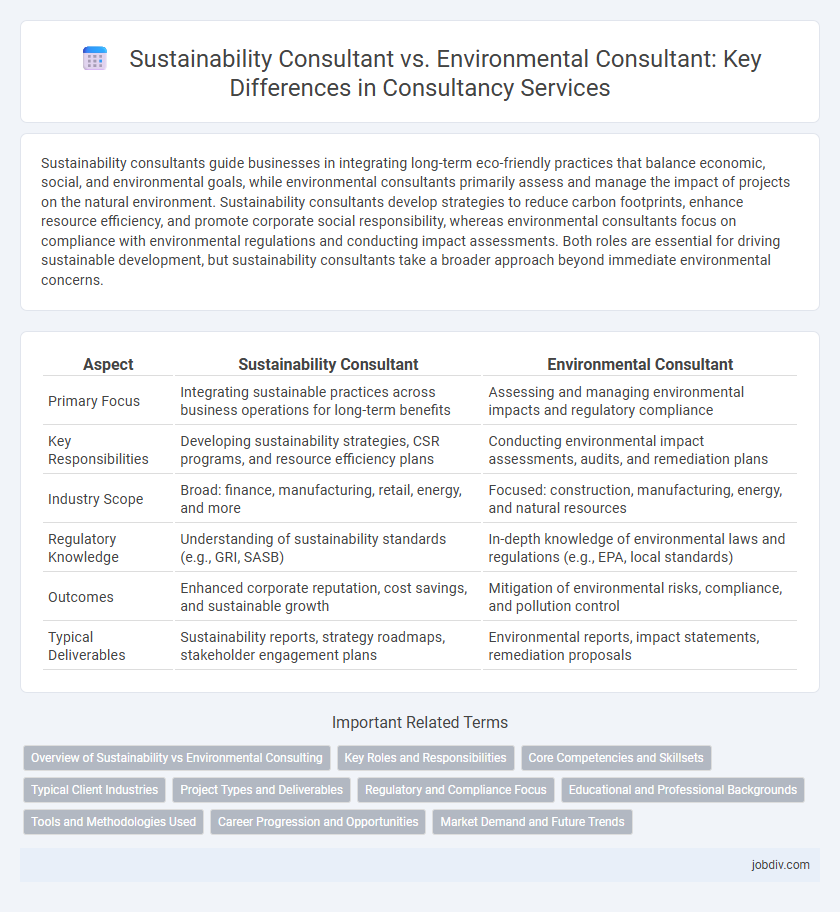Sustainability consultants guide businesses in integrating long-term eco-friendly practices that balance economic, social, and environmental goals, while environmental consultants primarily assess and manage the impact of projects on the natural environment. Sustainability consultants develop strategies to reduce carbon footprints, enhance resource efficiency, and promote corporate social responsibility, whereas environmental consultants focus on compliance with environmental regulations and conducting impact assessments. Both roles are essential for driving sustainable development, but sustainability consultants take a broader approach beyond immediate environmental concerns.
Table of Comparison
| Aspect | Sustainability Consultant | Environmental Consultant |
|---|---|---|
| Primary Focus | Integrating sustainable practices across business operations for long-term benefits | Assessing and managing environmental impacts and regulatory compliance |
| Key Responsibilities | Developing sustainability strategies, CSR programs, and resource efficiency plans | Conducting environmental impact assessments, audits, and remediation plans |
| Industry Scope | Broad: finance, manufacturing, retail, energy, and more | Focused: construction, manufacturing, energy, and natural resources |
| Regulatory Knowledge | Understanding of sustainability standards (e.g., GRI, SASB) | In-depth knowledge of environmental laws and regulations (e.g., EPA, local standards) |
| Outcomes | Enhanced corporate reputation, cost savings, and sustainable growth | Mitigation of environmental risks, compliance, and pollution control |
| Typical Deliverables | Sustainability reports, strategy roadmaps, stakeholder engagement plans | Environmental reports, impact statements, remediation proposals |
Overview of Sustainability vs Environmental Consulting
Sustainability consulting focuses on integrating economic, social, and environmental goals into business strategies to promote long-term viability and corporate responsibility. Environmental consulting centers primarily on assessing and managing a company's impact on natural resources and regulatory compliance related to pollution and ecosystem protection. Both fields aim to reduce negative environmental effects, but sustainability consulting encompasses broader organizational changes beyond immediate environmental concerns.
Key Roles and Responsibilities
Sustainability consultants primarily guide organizations in integrating eco-friendly practices and long-term social responsibility strategies into business operations, emphasizing resource efficiency, carbon footprint reduction, and sustainable supply chain management. Environmental consultants focus on compliance with environmental regulations, conducting site assessments, impact studies, and managing waste or pollution control to minimize ecological harm. Both roles require expertise in environmental science and policy, but sustainability consultants have a broader scope that includes economic and social dimensions beyond regulatory adherence.
Core Competencies and Skillsets
Sustainability consultants specialize in integrating eco-friendly practices with business strategies, emphasizing corporate social responsibility, sustainable development goals, and resource efficiency. Environmental consultants concentrate on regulatory compliance, environmental impact assessments, pollution control, and site remediation expertise. Both roles require strong analytical skills, knowledge of environmental laws, and proficiency in data analysis, but sustainability consultants also demand strategic planning and stakeholder engagement capabilities.
Typical Client Industries
Sustainability consultants primarily serve industries such as manufacturing, retail, and finance, helping businesses integrate long-term environmental, social, and economic practices into their operations. Environmental consultants focus more on sectors like construction, mining, and agriculture, providing expertise on regulatory compliance, environmental impact assessments, and pollution control. Both roles support industries in reducing their ecological footprint, but sustainability consultants emphasize strategic sustainability goals, while environmental consultants address specific environmental challenges and regulations.
Project Types and Deliverables
Sustainability consultants primarily focus on integrating long-term resource efficiency, social responsibility, and economic viability into business strategies, delivering comprehensive sustainability assessments, policy frameworks, and stakeholder engagement plans. Environmental consultants concentrate on mitigating environmental impacts related to specific projects such as site assessments, environmental impact statements, and regulatory compliance reports. Both roles require tailored project types, with sustainability consultants addressing broader corporate sustainability initiatives, while environmental consultants focus on project-specific environmental risks and remediation.
Regulatory and Compliance Focus
Sustainability consultants specialize in integrating long-term environmental, social, and economic objectives into business strategies, often navigating global reporting standards like GRI and SASB to ensure comprehensive sustainability compliance. Environmental consultants primarily focus on regulatory adherence related to environmental laws such as the Clean Air Act, Clean Water Act, and local environmental permits, conducting impact assessments and remediation plans. Both roles require thorough knowledge of compliance frameworks, but sustainability consultants address broader corporate responsibility, while environmental consultants concentrate on preventing and mitigating environmental risks within regulatory boundaries.
Educational and Professional Backgrounds
Sustainability consultants typically hold degrees in environmental science, sustainability management, or business sustainability, combined with professional certifications such as LEED Accredited Professional or ISSP Certified Sustainability Professional. Environmental consultants often have educational backgrounds in environmental engineering, ecology, or earth sciences, with expertise grounded in regulatory compliance and environmental impact assessments. Both roles require strong analytical skills, but sustainability consultants focus more on integrating sustainable practices within corporate strategy, while environmental consultants emphasize technical environmental assessments and regulatory adherence.
Tools and Methodologies Used
Sustainability consultants utilize lifecycle assessment software, carbon footprint calculators, and sustainability reporting frameworks like GRI and SASB to evaluate and improve corporate sustainability performance. Environmental consultants primarily employ environmental impact assessments (EIA), Geographic Information Systems (GIS), and pollutant dispersion models to analyze and mitigate ecological risks. Both roles integrate data analytics and stakeholder engagement tools, but their methodologies diverge based on strategic sustainability goals versus regulatory environmental compliance.
Career Progression and Opportunities
Sustainability consultants specialize in integrating long-term eco-friendly strategies across business operations, offering career progression into roles like Chief Sustainability Officer or Corporate Social Responsibility Manager. Environmental consultants focus on regulatory compliance, impact assessments, and remediation efforts, often advancing toward senior project management or environmental policy advisory positions. Both careers provide opportunities in diverse industries, but sustainability consulting typically emphasizes strategic planning and innovation, while environmental consulting centers on scientific analysis and legal frameworks.
Market Demand and Future Trends
Sustainability consultants are increasingly in demand as businesses seek to integrate long-term environmental, social, and economic goals into their corporate strategies, reflecting a broader commitment to ESG (Environmental, Social, and Governance) standards. Environmental consultants focus primarily on regulatory compliance and impact assessments related to pollution control and natural resource management, which remain critical but niche areas. Future trends indicate a growth trajectory for sustainability consultancy driven by rising consumer and investor pressure for transparent, sustainable practices across industries.
Sustainability Consultant vs Environmental Consultant Infographic

 jobdiv.com
jobdiv.com